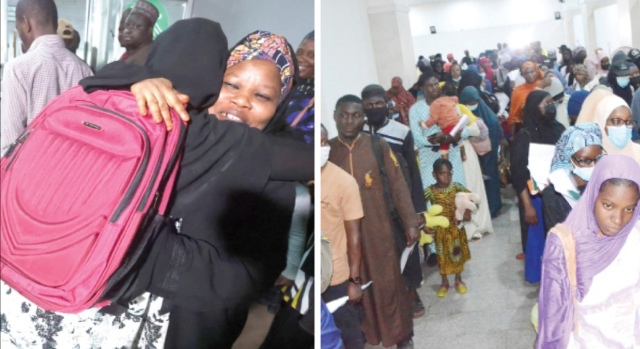
Nigerian evacuees from war-torn Sudan, having landed at the Nnamdi Azikiwe International Airport, Abuja, narrated their ordeal as they prayed that Nigeria never experiences war.
Halliru Bello, one of the evacuated Nigerian students, who spoke to Daily Trust, said as a medical student at the International University of Africa, Sudan, his academic programme had been put on hold because of the war that suddenly broke out in the country.

“It started at 11am when we started hearing gunshots and after three days, we started experiencing airstrikes and missiles.
“The next thing we were told was not to leave our homes. No access to the market to buy food and other things,” Bello said.
“Our experience was a very terrible one, we don’t pray for anyone ever to experience it. If you were not there, you won’t understand what we experienced.
“May Nigeria do all it takes never to experience war. Academic activities of students would be disrupted suddenly, with no access to food and basic amenities, no movement and you may die in the process when you’re hit by a bullet or missile,” he said.
According to him, after three days, the government of Sudan placed an order for other countries to evacuate their citizens, hence, it was at that point Nigerians in Sudan started making their way to the border between Sudan and Egypt.
He said although the experience was terrifying and frustrating, the Nigerian government made provision for their feeding.
Aisha Sumaila, another student, who was a nursing student at the International University of Africa in Sudan, said they suffered at the border because the Egyptian officers did not allow them access to the country.
She said the intervention of the Nigerian government eventually made it possible for them to gain access to Egypt, adding that she “slept in the open for 8 days.”
A footballer and businessman, Steven Chidera Wihioka, said it was a 16-hour journey from Khartoum to Egypt and when they finally arrived at the border, the Egypt officials refused them access, hence they slept outside at the border for eight days because they had nowhere to sleep.
Wihioka said there were citizens from other countries who were all trying to leave Khartoum for Egypt.
READ ALSO: First Batch Of 376 Sudan Evacuees Arrive Nigeria
He said his football career and business, the sale of female wigs, were ended by the war in Sudan.
The business man added that other footballers, who signed to play for some clubs, had not accessed their money before the war broke out.
Amina Balarabe, another returnee, who worked with the Nigerian Embassy in Sudan, decried her horrible experience, especially being stranded with six children.
She narrated that at the border, the Egypt government insisted that all requirements to gain access into their country be met before they would allow anyone to gain access to their country.
Balarabe said survival was difficult because most times, to access basic amenities such as a bathroom, food and water, one had to pay a lot of money, sometimes as much as $50 daily.
Another evacuee, a 300-level Physiotherapy student, who simply gave her name as Zainab, said she had lost hope in their survival in Sudan.
She described their condition as terrible, saying they were not treated like humans at the Aswan border in Egypt.
“When the war started, I didn’t know because we were sleeping, we just started hearing gunshots and rockets and we had to leave where we were for safety.
“We had to leave Khartoum for Egypt and it was totally hard for us. Some of us don’t have money and life there was very expensive. There were pregnant women and children who were sick.
“We didn’t think we would survive it because we slept in the car. All of our lives were in the car. Life there was totally hard and they treated us like we are not human beings at the Aswan border in Egypt where we spent six days,” she narrated.
Barakat Akinola, a student of the International University of Africa, Sudan, narrated: “We just woke up in the morning and started hearing the sounds of bombs and everyone had to start fleeing. It was just like a dream honestly but we thank God we’re all safe.
“So, the sound of bullets woke us up that morning. I was really scared and till now I haven’t recovered from the shock because we all thought something was burning not until when the bullets started entering the rooms.
“It was on the 25th of Ramadan, which was the 15th of April. Ha! They really destroyed Sudan, like all the companies, airports and many more were burnt down.”
Meanwhile, the federal government, in collaboration with the Dangote Foundation, gave the returnees N100, 000 each, recharge cards and data.
The Minister of Humanitarian Affairs, Social Development and Disaster Management, Sadiya Umar-Farouk, while receiving the returnees at the Nnamdi Azikiwe International Airport, Abuja, said returnees were given the items to enable them to travel to their respective homes and have access to their families through communication.
She said there were a lot of protocols that had to be followed to bring them back to Nigeria.
“We have to go through all the issues to get clearance from the Egyptian authority to enable Nigerians to get access to their country and eventually bring them back.
“War is not a good thing. You can see people who have gone to study, they’ve become refugees all of a sudden. This is an international crisis; also a humanitarian crisis in the sense that people have no food, no water, they don’t know where to go. It’s a very unfortunate and very pathetic situation and Nigerians should pray for peace in our country,” she said.








